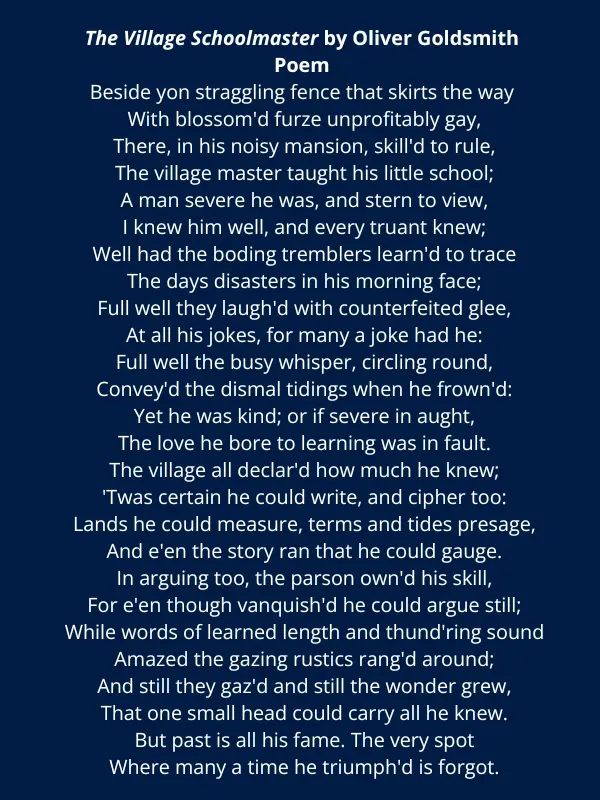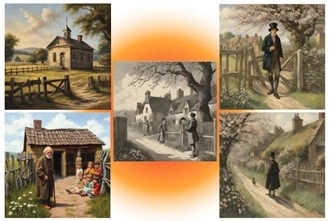Poem

Brief Biography of the Poet
The Village Schoolmaster by Oliver Goldsmith (1728-1774) was an Irish writer who made great contributions as a poet, novelist, playwright, and essayist. He became an important figure in the literary circles of 18th-century London. He was born in County Longford, Ireland, to a Protestant clergyman. He attended Trinity College Dublin before he moved to London to start his literary career.
Goldsmith was under financial constraint for most of his life. He had to work as a hack writer to make ends meet and control his expenses. Despite the economic problems, he did gain respect as a member of the literary circle that included Samuel Johnson, Edmund Burke, and other luminaries of the age. His relationship with Dr. Johnson was very cordial, and he was a regular member of the celebrated Literary Club.
His most important works include the poem The Deserted Village (1770), which is a nostalgic and critical look at rural life in the Agricultural Revolution, and the novel The Vicar of Wakefield (1766), a sentimental and popular work that was highly acclaimed by contemporaries such as Goethe. As a playwright, he is most remembered for the comedy She Stoops to Conquer (1773), which remains a classic of 18th-century English theatre.
Goldsmith was known for his subtle wit, emotional depth, and perceptive insights into human nature. Despite all his talents, he was often portrayed as somewhat unlucky and was frequently in financial straits. He died in London in 1774 at the relatively young age of 45, leaving behind a significant literary legacy. The celebrated Samuel Johnson wrote an epitaph for Goldsmith, which remarkably declared that he “touched and improved everything he wrote,” thus emphasizing the high regard in which he was held by his fellow writers.
Summary of the Poem
The Poem describes in detail, vivid portrayal of a schoolmaster against a rural village background, through elements of humor, reverence, and contemplation. His students and the community revere him with both an abject fear and respect and though he appears stern, one treasures him for his commitment toward education and passion for studies.
The poem highlights his intelligence capacities, including writing, arithmetic, and land measurement, along with his ability to make “cunning argument,” even in opposition. His use of complex and beautiful language is astounding enough that villagers worship him as a demigod. Goldsmith’s style weaves gentle satire with undisguised adoration, giving such vivid renderings of both the eccentricities and the intellect of the schoolmaster.
The poem culminates in a poignant recognition of the passage of time, pointing out that both the renown of the schoolmaster and the site of his achievements have shrunk into nothingness. This final reflection puts stress on the transience of human achievement and the inevitable changes brought by time.
Critical Appreciation of the Poem
Analysis:
1. Setting and Tone:
The opening lines set the scene beside a “straggling fence,” a symbol of rural simplicity, and describe the schoolmaster’s “noisy mansion,” a humorous exaggeration for his modest schoolhouse. The tone is affectionate and light satire as it portrays the schoolmaster as a figure of authority in an idyllic yet unremarkable village.
2. Characterization of the Schoolmaster:
– Severe yet Admirable: The schoolmaster is described as “severe” and “stern to view,” which forms an impression of a disciplinarian who inspires awe and even inspires fear. But in contrast to that severity lies the passion for education that seals the persona as a multilayered character whose sternness results from devotion toward learning.
– Community Perception: For the villagers, he is a fount of wisdom. His expertise in writing, calculation, land measurement, and tide prediction have made him an icon of sorts for them, an example of the limited formal education opportunities around the village.
– Comic Qualities: His comedy, though seemingly not of pure comedy, comes with ” counterfeit glee,” providing a light-hearted satire of the villagers’ adoration for him despite the flaws.
3. Intellectual faculties:
The schoolmaster’s ability to argue, even when he is wrong, and his use of “words of learned length and thundering sound” emphasize his intelligence and the wonder it evokes. The hyperbole that “one small head could carry all he knew” emphasizes his exceptional status in the village, but also playfully mocks his bombastic style.
4. Themes:
– Knowledge and Education: The schoolmaster is the embodiment of education as a treasured but rare commodity in the community.
– The Passage of Time: The final words suggest that even the greatest person is forgotten. The “very spot” where his accomplishments took place is now covered up, evoking feelings of inexorable decline and the transience of fame.
5. Form and Style:
The poem employs rhymed couplets and a fluid rhythm that reflects the tradition of oral storytelling. Goldsmith skilfully balances satire with reverence, combining elevated diction with approachable language to captivate a diverse audience.
In conclusion, The Village Schoolmaster honours a former time of rural existence, interweaving affection, humour, and a nostalgic recognition of the passage of time that erases human accomplishments.
Multiple Choice Questions
1. What plant skirted the fence?
a) furs
b) furze
c) fagus
d) fern
2. Where did the schoolmaster live?
a) cottage
b) bunglow
c) mansion
d) apartment
3. How did the pupils view the schoolmaster?
a) silly and slow
b) soft and sassy
c) sad and shrewd
d) severe and stern
4. What did the schoolmaster love above all?
a) descipline
b) learning
c) ciphering
d) debate
5. Why is the poet sad for the schoolmaster?
a) that he is forgotten
b) that he wasn’t learning
c) that he left the village
d) that he wasn’t his student
6. Where does the schoolmaster's house stand in the poem?
a) In the middle of the village
b) Beside a straggling fence
c) Next to the church
d) Near the marketplace
7. What is notable about the blossoms on the furze near the school?
a) They are rare and fragrant.
b) They are unprofitably gay.
c) They are the pride of the village.
d) They are used for medicinal purposes.
8. How do the students react to the schoolmaster’s jokes?
a) They genuinely laugh with joy.
b) They laugh with counterfeited glee.
c) They remain silent out of fear.
d) They criticize his humour privately.
9. What emotion do the students feel when the schoolmaster frowns?
a) Dismay
b) Curiosity
c) Defiance
d) Admiration
10. What skill is the schoolmaster particularly recognized for in the village?
a) Writing poetry
b) Reading aloud
c) Arguing persuasively
d) Farming techniques
11. What amazes the villagers about the schoolmaster?
a) His strict discipline
b) His ability to measure land
c) His small head carrying so much knowledge
d) His storytelling ability
12. What is the primary reason for the schoolmaster’s stern behavior?
a) Personal dissatisfaction
b) Lack of resources in the village
c) His love for learning
d) Pressure from the villagers
13. Which of the following does the schoolmaster NOT do, according to the poem?
a) Presage tides
b) Gauge lands
c) Teach reading
d) Perform religious ceremonies
14. What happens to the fame of the schoolmaster by the end of the poem?
a) It is immortalized in the village.
b) It fades and is forgotten.
c) It spreads to nearby towns.
d) It becomes a legend passed down generations.
15. What does the poem reflect on in its closing lines?
a) The joy of education
b) The transient nature of fame
c) The challenges of rural life
d) The beauty of nature around the school
Answer the questions briefly (30-40 words)
1. Where is the schoolmaster's school located?
The school is besides a straggling fence with blossomed furze. This kind of setting is simple yet pretty, showing the rural charm the village has.
2. How is the schoolmaster described in terms of his demeanour?
The schoolmaster has a stern and severe countenance, which instils respect and fear in his pupils and the village community.
3. How did the frown of the schoolmaster affect the children?
His frown brought dismay in the children who spoke in whispers because they knew his mood often foretold the troubles of the day.
4. What qualities made the schoolmaster respected in the village?
He had the writing, mathematics, and also the expertise in land survey and tidal forecasting which made him the community’s honoured intellectual.
5. What is the response of the villagers when they consider the schoolmaster's knowledge?
The people showed amazement at the vastness of his knowledge, looking at the sheer power of an individual to remember so many things.
6. How did humour relate to the schoolmaster's character?
Although the schoolmaster was strict, he took pleasure in humour. Students chuckled with “counterfeited glee,” acknowledging his authority despite their feelings of unease.
7. What does the poem suggest about the schoolmaster’s love for learning?
His severity originated from his profound passion for learning, indicating his commitment to education and intellectual advancement.
8. What is the significance of the poem’s closing lines?
The concluding lines reflect on the transience of fame as the schoolmaster’s good deeds fade from memory.
9. How is the use of language by the schoolmaster depicted in the poem?
He used long, sonorous vocabulary that astonished the villagers, representing his intellectual powers and oratorial skill.
10. What is the theme on human achievements which the poem brings out?
The poem underlines the fleeting nature of human achievements, emphasizing the inevitability of time passing which inevitably erases even the greatest legacies.
References:
Board of editors. Literary Mindscapes I. Macmillan Publishers India Pvt. Ltd. Chennai, 2021.


1 thought on “The Village Schoolmaster by Oliver Goldsmith”